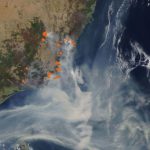 August 23, 2021 8:36 am
Published by Jenny Rislund
August 23, 2021 8:36 am
Published by Jenny Rislund
This project will explore the use of supervised and unsupervised statistical learning methods (such as neural networks, random forest, clustering) to understand the impact of climate change on hydrological extremes and/or to simulate downstream impacts on affected sectors, such as agriculture, energy, transport, water resources management.
 February 12, 2021 11:35 am
Published by Climate Extremes
February 12, 2021 11:35 am
Published by Climate Extremes
CLEX researchers and colleagues quantified the air quality impact of the Black Summer bushfires of 2019/20 and COVID-19 in the south-eastern states of Victoria and New South Wales (NSW) using a meteorological normalisation approach.
 August 24, 2020 2:40 pm
Published by Jenny Rislund
August 24, 2020 2:40 pm
Published by Jenny Rislund
In this project the student will apply a new algorithm to map the expansion of cities across Southeast Asia. Combining this with proxies of energy consumption and fossil fuel emission the student will establish trends in regional emissions and project these emission trends into the future.
October 14, 2019 3:41 pm
Published by Climate Extremes
Workshop Scope The Bureau of Meteorology Annual R&D Workshop 2019 will provide a forum for national and international researchers, including researchers from across the Bureau, CSIRO, industry and our university partners, to communicate innovations and advances in sciences related to weather, water, ocean and climate services. Environmental forecast services range from routine daily weather forecasts for the public to seasonal outlooks and climate projections aimed at informing decisions by agriculture and water managers. Emergency managers rely on highly customised services... View Article
 July 20, 2019 2:00 am
Published by Climate Extremes
July 20, 2019 2:00 am
Published by Climate Extremes
In this project, the selected student will develop a numerical algorithm to generate a spatial map of Antarctic ice algal biomass using Machine Learning.




